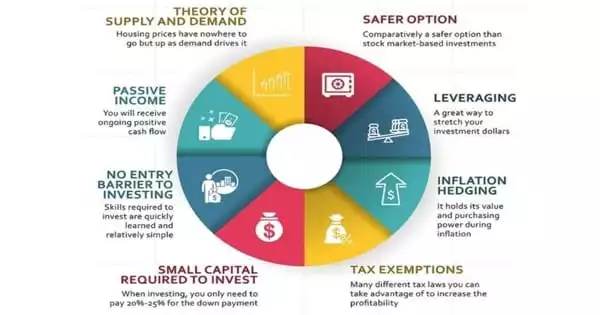Real estate investment can be beneficial in the long run. It has the potential to generate lucrative returns if done correctly. When it comes to real estate investing, you have a lot of options. You can buy a single-family home, rent it out, and collect monthly rent checks while waiting for its value to rise to the point where you can sell it for a large profit. Alternatively, you could buy a small strip mall and collect monthly rents from hair salons, pizza restaurants, mattress stores, and other businesses.
Benefits of Investing in Real Estate – The advantages of pooling money in real estate are as follows:
- Build Equity for the Future
One of the benefits of investing in real estate is the ability to accumulate equity. Equity is a type of asset that is included in your net worth. You accumulate equity as you pay off your mortgage. You now have the leverage to acquire additional rental properties and increase your cash flow as you build equity.
- High Maintenance and Management
Real estate investment entails purchasing a physical asset and incurring maintenance costs. The investor must also manage the source of income that is generated.
- Generate Passive Income
You can generate nearly tax-free passive income by investing in real estate. Even when you’re sleeping, your rental properties are working for you. By purchasing several rental properties that generate enough income to cover your expenses, you can free up your time to do what you want rather than spending it all at work.
- Huge Transaction Cost
Buying and selling real estate is an expensive endeavor. The transaction costs, including registry fees, legal fees, diversion, and so on, are so high that the buyer’s cost of investment rises.
- Long Term Financial Security
The advantages of real estate investing are provides investors with long-term financial security. When you have a consistent flow of cash in succession, the benefits of this investment last for a long time. Because of the property’s appreciation in value over time, owning a rental property can provide investors with a sense of security. This means that the value of your property will most likely rise because land and buildings are appreciating assets.
- Creates Financial and Legal Liability
If the investor purchases a property on loan, he or she may become overburdened by financial liability. Even transferring ownership at the time of property purchase imposes a legal obligation on the investor.
- Less Liquid in Nature
Real estate, unlike other investments such as stocks, cannot be easily bought and sold on a regular basis. As a result, it may not be a good investment for investors looking for quick profits.
- Requires Dealing with Market Inefficiencies
Investors who lack the necessary information about a prospective real estate project may pool their funds and invest in less profitable projects.
- No Fixed Maturity
Real estate appraisal does not take place at a set rate over a set period of time. In the case of real estate, capital appreciation is a long-term process that is assumed but not pre-defined.
- Hedge against Inflation
Inflation is defined as an increase in the general level of prices for goods and services that continues over time. In other words, it causes each dollar you own to purchase a smaller proportion of a good or service over time. Stocks, for example, have become more expensive to purchase as inflation has risen. In essence, inflation prevents your money from traveling as far as it could.
















